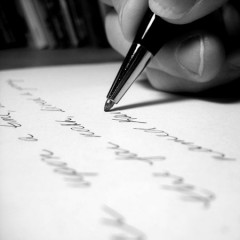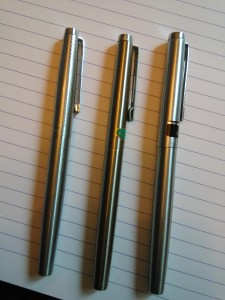
I recently received a note saying that as editor of the written portion of the Chronicles Unwritten podcast, I, along with the writer/creator, Diamond Dave Maier, are inspiring Aiden (#lilman) from Full of Fibre podcast, to “keep trying and working at writing.”
To hear this was uplifting, as much as my coffee that morning. So to continue the thanks from my “Coffee’d Up” post, I’ve decided to write some advice for all writers, and specifically for Aiden, to aid in the process.
To start with, writing isn’t always easy.
Despite the fact that writing can come naturally to some, it gets easier for those who feel they lack the natural ability. All you have to do is put in the time. Writing, like most things, requires practice. Stretch yourself. Write fiction, non-fiction, poetry, short stories, short-short stories, whatever inspires you to put pen to paper, write it down.
Never be discouraged by your own work, no one is good at baseball when they first start playing, right?
That leads us to the second thing. Always carry a notebook and three pens!
Half ideas, lines, quotes, it doesn’t matter, whatever you want to write down, write it down. In high school and college I swore by black and white composition notebooks. These days, I carry around a moleskin notebook and in a pinch, I’ll type or dictate it on my phone. Point is: inspiration will happen when you least expect it. Be ready.

Carry Three Pens
Now, about those pens… Why three? Because there is nothing more frustrating than not being able to find a pen when you have something you want to put down on paper. That, and for some reason, I always find myself lending one out, so once I have been nice enough to let someone borrow a pen, which I usually don’t get back, I still have a backup.
Next, understand that writing will take you on a journey of it’s own.
Poetry was my gateway, then I moved on to short stories. And now as a blogger, I have the opportunity to tell stories and inform people about the things I am most passionate about. As long as you have passion, the words will flow. Also, many writers (fiction writers especially) are quoted as saying “stories write themselves”, meaning that you may find that written projects can steer into places you didn’t anticipate. Be open to these things, you can always change them later.
Don’t get down on yourself.
Look, inspiration doesn’t always come when it’s “writing time” and often your work may feel like junk. Both are natural occurrences. Over time, you’ll see that moments like those are actually part of the process. It’s fine if you don’t have anything to say. The notebook you’ve been recording thoughts in, flip through those. They will help inspire you… but there’s another, more important trick.
Read, read, read, and read! Because reading is the key to good writing.
Reading expands your knowledge base of how things can be done, as every author writes differently, and subconsciously, you will learn from them. People don’t learn just by “doing” or being “taught” – we also learn by observation. So, if you actively try to study how they write, you’ll learn even more.
Additionally, reading will expand your vocabulary, since without new words, you’ll end up repeating yourself. Also, challenge yourself to read different types of books. You’ll never know who your favorite author might be next year if you keep changing it up.
Talking to people can also assist you in writing. As conversations and storytelling are just great examples of how people really do those particular things, which would also include listening to podcasts. If you want to be better at writing dialogue or conversations listen to how people talk. Eavesdrop in public, on the bus, at the park. Don’t just listen for slang, listen for where they put emphasis. See in your mind their speech as text. Where would you put the commas?

Editing
And lastly, when you’re ready to share it, first, get yourself a good editor, or two…
And when I say “good editor” that can also mean just a friend who is smarter than you. Or not. They just have to be a person who’s opinion you’d trust about this type of thing. An avid reader, preferably. And generally speaking, not Mom and Dad who likely will just love anything you do. (Even if they give you some notes, you’ll feel like they probably overlooked something.) I have an editor, his name is Chris Hughes and he has been one of my closest friends for over a decade! While he is great at fixing my run-on sentences and misplaced commas, we talk about the changes, so I can learn from them. That’s the key. A good editor will teach you and help you learn to grow as a writer.
And he’s not my only editor. Bill Sweeney of The Wicked Theory Podcast also takes a look at my stuff from time to time to challenge me, as Chris does, to help me improve. He’s a more recent friend that I feel like I’ve known forever, or too long, if you ask him. These kinds of editors, or friends as the case may be, have helped me grow beyond editing my own stuff.
There you have it. It’s not that hard, really, put in the time and you’ll be finishing your first novel, book of poetry or collection of short stories in no time!